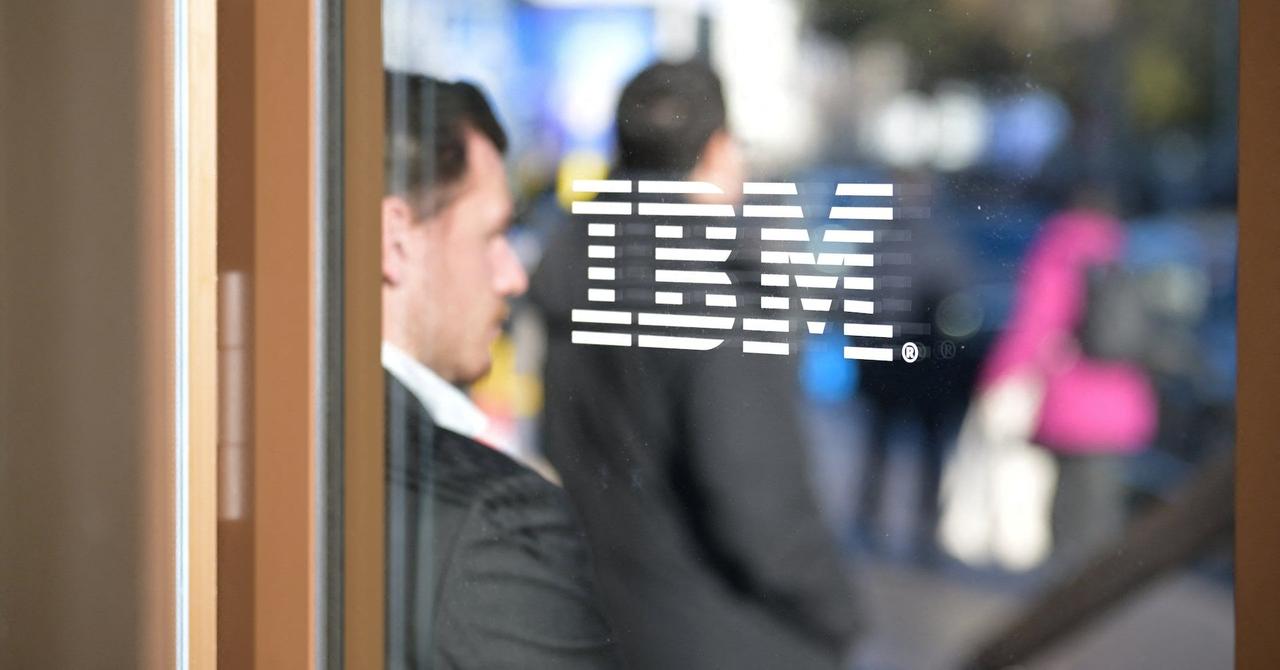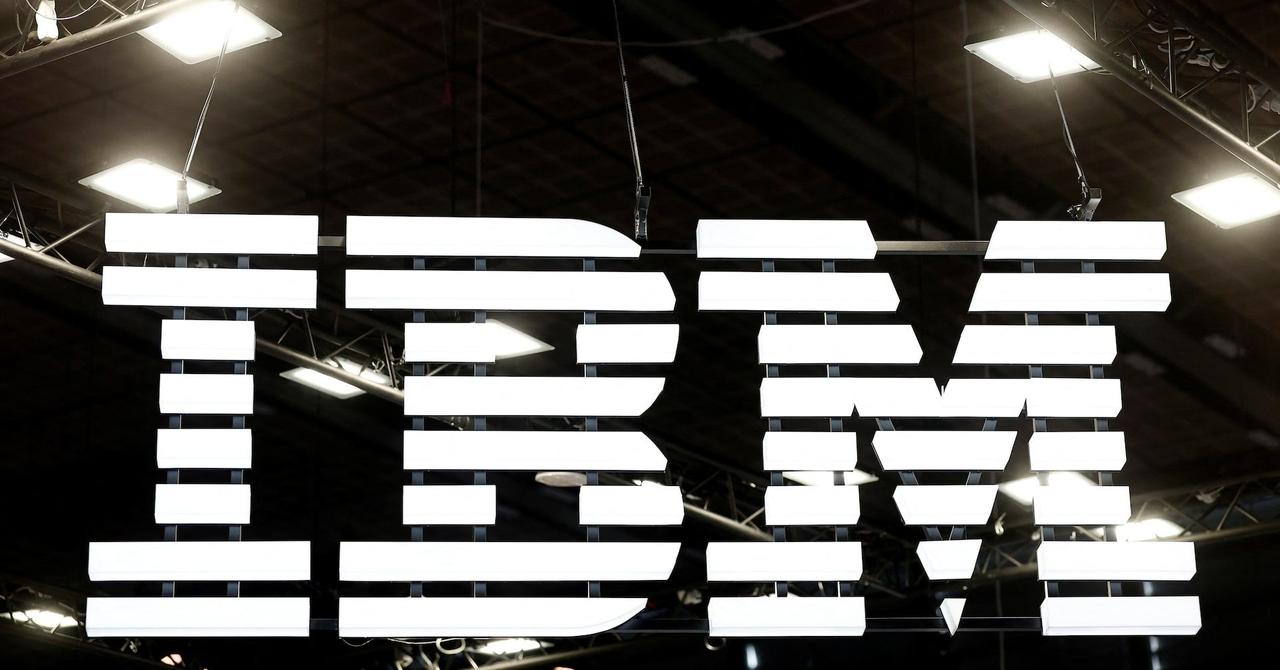IBM's Q4 Performance: Software and AI Boost Revenue Amid Consulting Slowdown
6 Sources
6 Sources
[1]
IBM gets lift from software, AI demand as consulting slips
IBM surpassed second-quarter revenue expectations and raised its annual growth outlook for its software business due to increased AI-related spending. The Watsonx platform expansion and Granite AI models helped boost software revenue by 7%. Despite this, consulting revenue fell 1% as clients cut back on short-term projects. IBM's total revenue reached $15.77 billion.IBM beat analysts' estimates for second-quarter revenue and raised its annual growth forecast for its software business on Wednesday, riding on higher AI-linked spending by clients looking to adopt the technology. The company has focused on expanding its Watsonx platform that allows users to deploy chatbots or enhance code for AI programs, while also making its Granite family of AI models open-source to help popularize its AI services. Big Blue's shares rose about 3% in extended trading, set to add to their year-to-date gains of about 12% from a rally in stocks of AI-linked companies. Software revenue increased about 7% to $6.74 billion in the quarter. The 113-year-old company now expects the segment to grow at a high-single-digit percentage in 2024, compared to its prior forecast of slightly above the high end of mid-single digit percentage. The company's AI Book of Business - a combination of bookings and actual sales across various products - grew to $2 billion, of which about $1 billion was added in the second quarter. "The commercialization of Generative AI is accelerating, positioning diversified enterprise technology companies like IBM to capitalize on the growing demand for AI integration," said Tejas Dessai, a research analyst at Global X. Meanwhile, IBM lowered its expectations for annual consulting revenue, estimating growth in low-single-digit percentages compared to its prior forecast of 6%-8%. Consulting revenue fell about 1% to $5.18 billion in the second quarter, as clients cut back on discretionary spending and short-term consulting projects amid higher-for-longer interest rates and inflationary pressures. "You're seeing an overall very dynamic macroeconomic environment, and underneath that, clients are choosing technology for competitive advantage. They are spending on GenAI," Chief Financial Officer James Kavanaugh told Reuters. "But they are making trade-off decisions and spending reprioritizations, and you see that play out within consulting." Companies have prioritized spending on longer-term consulting projects centered on their AI businesses - revenue from which is yet to be reflected in IBM's books. IBM reported revenue of $15.77 billion, compared with analysts' average estimate of $15.62 billion, according to LSEG data. Second-quarter adjusted profit of $2.43 per share beat estimates of $2.20, helped by robust sales in the high-margin software business.
[2]
IBM beats quarterly revenue estimates on software strength, AI demand
July 24 (Reuters) - IBM beat analysts' estimates for second-quarter revenue on Wednesday, riding on strong demand for its software and higher AI-linked spending by clients looking to tap the booming technology. The company reported revenue of $15.77 billion, compared with analysts' average estimate of $15.62 billion, according to LSEG data. IBM has focused on expanding its Watsonx platform that allows users to deploy chatbots or enhance code for AI programs, while also making its Granite family of AI models open-source to help popularize its AI services. Sales in the software segment increased about 7% to $6.74 billion. About 75% of the revenue was recurring, CFO James Kavanaugh told Reuters. The company's AI Book of Business - a combination of bookings and actual sales across various products - grew to $2 billion, of which about $1 billion was added in the second quarter. Consulting made up 75% of the AI book with the rest coming from software, Kavanaugh said. Still, consulting revenue fell about 1% to $5.18 billion as clients cut back on discretionary spending and short-term consulting projects. "You're seeing an overall very dynamic macroeconomic environment, and underneath that, clients are choosing technology for competitive advantage. They are spending on GenAI," Kavanaugh said. "But they are making trade-off decisions and spending reprioritizations, and you see that play out within consulting." Companies have prioritized spending on longer-term consulting projects centered on their AI businesses - revenue from which is yet to be reflected in IBM's books. Still, second-quarter adjusted profit of $2.43 per share beat estimates of $2.20, as robust sales in the high-margin software business have helped offset consulting weakness.
[3]
IBM beats quarterly revenue estimates on software strength, AI demand
IBM has focused on expanding its Watsonx platform that allows users to deploy chatbots or enhance code for AI programs, while also making its Granite family of AI models open-source to help popularize its AI services. Sales in the software segment increased about 7% to $6.74 billion. About 75% of the revenue was recurring, CFO James Kavanaugh told Reuters. The company's AI Book of Business - a combination of bookings and actual sales across various products - grew to $2 billion, of which about $1 billion was added in the second quarter. Consulting made up 75% of the AI book with the rest coming from software, Kavanaugh said. Still, consulting revenue fell about 1% to $5.18 billion as clients cut back on discretionary spending and short-term consulting projects. "You're seeing an overall very dynamic macroeconomic environment, and underneath that, clients are choosing technology for competitive advantage. They are spending on GenAI," Kavanaugh said. "But they are making trade-off decisions and spending reprioritizations, and you see that play out within consulting." Companies have prioritized spending on longer-term consulting projects centered on their AI businesses - revenue from which is yet to be reflected in IBM's books. Still, second-quarter adjusted profit of $2.43 per share beat estimates of $2.20, as robust sales in the high-margin software business have helped offset consulting weakness. (Reporting by Arsheeya Bajwa in Bengaluru)
[4]
IBM gets lift from software, AI demand as consulting slips
Software revenue increased about 7% to $6.74 billion in the quarter. The 113-year-old company now expects the segment to grow at a high-single-digit percentage in 2024, compared to its prior forecast of slightly above the high end of mid-single digit percentage. The company's AI Book of Business - a combination of bookings and actual sales across various products - grew to $2 billion, of which about $1 billion was added in the second quarter. "The commercialization of Generative AI is accelerating, positioning diversified enterprise technology companies like IBM to capitalize on the growing demand for AI integration," said Tejas Dessai, a research analyst at Global X. Meanwhile, IBM lowered its expectations for annual consulting revenue, estimating growth in low-single-digit percentages compared to its prior forecast of 6%-8%. Consulting revenue fell about 1% to $5.18 billion in the second quarter, as clients cut back on discretionary spending and short-term consulting projects amid higher-for-longer interest rates and inflationary pressures. "You're seeing an overall very dynamic macroeconomic environment, and underneath that, clients are choosing technology for competitive advantage. They are spending on GenAI," Chief Financial Officer James Kavanaugh told Reuters. "But they are making trade-off decisions and spending reprioritizations, and you see that play out within consulting." Companies have prioritized spending on longer-term consulting projects centered on their AI businesses - revenue from which is yet to be reflected in IBM's books. IBM reported revenue of $15.77 billion, compared with analysts' average estimate of $15.62 billion, according to LSEG data. Second-quarter adjusted profit of $2.43 per share beat estimates of $2.20, helped by robust sales in the high-margin software business. (Reporting by Arsheeya Bajwa in Bengaluru; Editing by Sriraj Kalluvila)
[5]
IBM gets lift from software, AI demand as consulting slips - ET Telecom
Enterprise Services 2 min read IBM gets lift from software, AI demand as consulting slips The company's AI Book of Business - a combination of bookings and actual sales across various products - grew to $2 billion, of which about $1 billion was added in the second quarter. IBM beat analysts' estimates for second-quarter revenue and raised its annual growth forecast for its software business on Wednesday, riding on higher AI-linked spending by clients looking to adopt the technology. The company has focused on expanding its Watsonx platform that allows users to deploy chatbots or enhance code for AI programs, while also making its Granite family of AI models open-source to help popularize its AI services. Big Blue's shares rose about 3% in extended trading, set to add to their year-to-date gains of about 12% from a rally in stocks of AI-linked companies. Software revenue increased about 7% to $6.74 billion in the quarter. The 113-year-old company now expects the segment to grow at a high-single-digit percentage in 2024, compared to its prior forecast of slightly above the high end of mid-single digit percentage. The company's AI Book of Business - a combination of bookings and actual sales across various products - grew to $2 billion, of which about $1 billion was added in the second quarter. "The commercialization of Generative AI is accelerating, positioning diversified enterprise technology companies like IBM to capitalize on the growing demand for AI integration," said Tejas Dessai, a research analyst at Global X. Meanwhile, IBM lowered its expectations for annual consulting revenue, estimating growth in low-single-digit percentages compared to its prior forecast of 6%-8%. Consulting revenue fell about 1% to $5.18 billion in the second quarter, as clients cut back on discretionary spending and short-term consulting projects amid higher-for-longer interest rates and inflationary pressures. "You're seeing an overall very dynamic macroeconomic environment, and underneath that, clients are choosing technology for competitive advantage. They are spending on GenAI," Chief Financial Officer James Kavanaugh told Reuters. "But they are making trade-off decisions and spending reprioritizations, and you see that play out within consulting." Companies have prioritized spending on longer-term consulting projects centered on their AI businesses - revenue from which is yet to be reflected in IBM's books. IBM reported revenue of $15.77 billion, compared with analysts' average estimate of $15.62 billion, according to LSEG data. Second-quarter adjusted profit of $2.43 per share beat estimates of $2.20, helped by robust sales in the high-margin software business.
[6]
IBM reports boost in AI bookings, better-than-expected revenue
About three-fourths of the AI bookings are made up of consulting, with the rest from software, Chief Executive Officer Arvind Krishna said in an interview. Over time, the revenue share from software is likely to increase, he added. Second-quarter sales increased 2% to $15.8 billion, slightly ahead of the $15.6 billion average estimate from analysts. IBM's software unit revenue increased 7% to $6.7 billion, ahead of analysts' estimates, according to data compiled by Bloomberg. In recent years, Big Blue has worked to transform itself from a legacy hardware company into one focused on high-growth software and services. It has made moves to expand the company's offerings with its proposed takeover of Hashicorp Inc., announced in April, and last year's purchase of Apptio for $4.6 billion. Red Hat posted growth of 7%, another relatively slow quarter for the acquired software business that once regularly grew at about 20% a quarter. Bookings for Red Hat are up, a good signal for the second half of the year, Krishna said. Still, IBM's consulting segment continued to experience weakness. Unit revenue declined 1% to $5.2 billion, missing estimates. Shares gained about 4% in extended trading after closing at $184.02 in New York. The stock has gained almost 13% this year. Profit, excluding some items, was $2.43 a share in the period ended June 30. Analysts, on average, projected $2.20. For the full year, IBM said free cash flow will be more than $12 billion. That represents a slight increase from a previous full-year guidance of "about" $12 billion. Last week, Hashicorp said that regulators have requested additional information about its planned acquisition by IBM, suggesting increased scrutiny might delay the approval process. Krishna said he is "still quite confident" the deal will close before the end of the year.
Share
Share
Copy Link
IBM reports better-than-expected Q4 revenue, driven by strong software sales and AI demand. The tech giant's consulting business experiences a decline, while its infrastructure segment shows growth.

IBM Exceeds Revenue Expectations in Q4 2023
International Business Machines Corp (IBM) has reported a stronger-than-anticipated fourth-quarter revenue, primarily driven by robust software sales and increasing demand for artificial intelligence (AI) solutions. The tech giant's performance in the last quarter of 2023 showcases its successful pivot towards high-growth areas, despite challenges in its consulting business
1
.Software Segment Leads Growth
IBM's software segment emerged as the star performer, with revenue rising by 3% to reach $7.51 billion. This growth was largely attributed to the company's data and AI-driven solutions, as well as its Red Hat business
2
. The strong performance in this segment underscores IBM's strategic focus on developing and marketing cutting-edge software solutions.AI Demand Fuels Revenue Boost
The increasing adoption of AI technologies across various industries has significantly contributed to IBM's revenue growth. The company reported that its AI-powered products, including watsonx, have gained traction among clients seeking to integrate advanced AI capabilities into their operations
3
.Infrastructure Segment Shows Resilience
IBM's infrastructure segment, which includes mainframe computers, demonstrated resilience with a 2.7% increase in revenue, reaching $4.60 billion. This growth indicates the continued relevance of IBM's traditional hardware business in the evolving tech landscape
4
.Consulting Business Faces Challenges
While software and AI drove growth, IBM's consulting segment experienced a decline. Revenue in this area dropped by 3% to $4.8 billion, reflecting broader market challenges and potentially shifting client priorities
5
. The company attributes this slowdown to reduced discretionary spending by clients and a strategic shift towards more profitable engagements.Related Stories
Overall Financial Performance
For the fourth quarter, IBM reported total revenue of $17.38 billion, surpassing analysts' expectations of $17.30 billion. The company's earnings per share stood at $3.87, aligning closely with market estimates. These results demonstrate IBM's ability to navigate a complex business environment while capitalizing on emerging technologies
2
.Future Outlook and Strategic Direction
Looking ahead, IBM remains optimistic about its growth prospects, particularly in the realms of AI and hybrid cloud computing. The company's CEO, Arvind Krishna, emphasized the potential of generative AI to drive significant value for clients across various industries. IBM's focus on these high-growth areas is expected to continue shaping its strategy and investments in the coming years
1
.References
Summarized by
Navi
[2]
Related Stories
IBM beats fourth-quarter revenue estimates as artificial intelligence boosts software demand
29 Jan 2026•Business and Economy

IBM's Q2 Earnings Beat Estimates, Driven by AI Mainframe Sales, but Software Segment Disappoints
24 Jul 2025•Business and Economy

IBM's Strong Q3 2025: AI Fuels Revenue Growth Across Software, Hardware, and Consulting
23 Oct 2025•Business and Economy

Recent Highlights
1
ByteDance Faces Hollywood Backlash After Seedance 2.0 Creates Unauthorized Celebrity Deepfakes
Technology

2
Microsoft AI chief predicts artificial intelligence will automate most white-collar jobs in 18 months
Business and Economy

3
Google reports state-sponsored hackers exploit Gemini AI across all stages of cyberattacks
Technology





